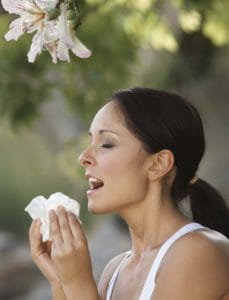 Spring and summer allergies can leave you feeling stuffed up and miserable, but there are new treatments on the horizon that can help you get outside and enjoy the season.
Spring and summer allergies can leave you feeling stuffed up and miserable, but there are new treatments on the horizon that can help you get outside and enjoy the season.
Antihistamines – Non-sedating antihistamines are adequate antidotes to pollen allergens for some. They don’t stop the inflammation involved with more bothersome symptoms.
Sprays – Nasal antihistamine sprays also aren’t in the same league as corticosteroid sprays for reducing swelling in the nose. That’s where allergist Dr. Richard Weber, a professor of medicine at National Jewish Health in Denver, says nasal steroids excel.
Two nasal sprays that used to be only available by prescription are now available over the counter at your local pharmacy. Nasacort Allergy 24HR and Flonase Allergy Relief are first prescription-strength nasal sprays. Plus, there are others your allergist may suggest.
Facts About Allergy Nasal Sprays
Florida allergist Dr. Dana Wallace says it’s important to remember the nasal steroid sprays don’t provide immediate relief. It can take two-to-four weeks to start feeling their effects.
Dr. Paul Keith, an allergy and immunology professor at McMaster University in Canada, adds that it’s important to direct the spray away from the center of your nose to avoid nosebleeds. Nasal sprays are also a good choice if you’re pregnant, in which case Weber recommends a category B steroid called Rhinocort.
Immunotherapy – commonly called allergy shots, this therapy may be the best approach for people with numerous environmental allergies. Although it does mean regular doctor’s visits for several years, the shots can build up tolerance for numerous allergens at once.
SLIT treatment – People with grass allergy can now ask an allergist about the new sublingual immunotherapy tablets on the market, in which the pill is held under the tongue and quickly dissolves. Like allergy shots, they work by introducing your immune system to a tiny amount of pollen every day, which eventually makes you less sensitive. After weeks of exposure, the way your immune system reacts to pollen changes. If you’re a good candidate, you should begin taking Grastek or Oralair about three months ahead of grass season.
For more tips on dealing with seasonal allergies, check out our Outdoor Allergy Hub here.





